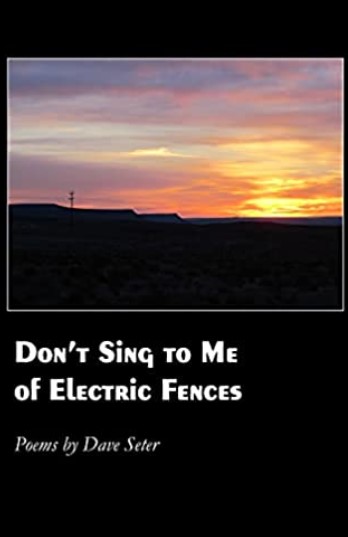
“The title of my poetry collection comes from the last line in my poem ‘Open Range’ which explores my drive from Boise to the Duck Valley Reservation to work on a mine reclamation project.
I experienced that part of the Western United States with all the complications of disappearing culture, including among the last stretches of unfenced or ‘open’ range, and the ascendant culture of hard rock mining and appetite for copper.” —Dave Seter, Don’t Sing to Me of Electric Fences
Reviews of “Don’t Sing to Me of Electric Fences“
“The title of Seter’s captivating collection may remind you of Whitman’s ‘I Sing the Body Electric’ from Leaves of Grass, but where Whitman celebrates the human physical body, Seter’s poems, in party, decry the effect humans have had on nature and revel in nature itself. Electricity runs throughout the pages, from ‘Open Range,’ where the speaker meets a free-range steer in the middle of a road, leading him to ponder electric fences, to ‘Homemade Electric Fence,’ and more. These are poems of place written by a man who is ‘strictly a dreamer of clouds and comets,’ who brings us along with him where beauty can’t be ‘owned/only borrowed.’” —Katherine Hastings, Shakespeare & Stein Walk Into a Bar, Poet Laureate Emerita, Sonoma County
“In Don’t Sing to Me of Electric Fences, Dave Seter enters into philosophical conversations with the seemingly doomed natural world; a conversation conscious of the fact that while we hold agency over nature’s fate, nature holds agency over its own survival.
Throughout the collection it is the spectacle of nature caught in chance encounters with birds, animals and insects like night herons, bald eagles or mating pair of Mission blue butterflies that makes the speaker realize that thought he seeks answers from nature, those answers will always be written in ‘scraps of a letter in a language I didn’t understand.’
Seter’s observations are both scientific and inviting. They visit us like ghosts, helping us see the natural world around us more intimately than we ever could have on our own.” —Iris Jamahl Dunkle, Interrupted Geographics, Poet Laureate Emerita, Sonoma County
“Dave Seter offers clear, thoughtful poems that delight in so many conscious beings including animals, plants, oceans, and mountains. They embody a careful watchfulness that seeks to uncover inner mechanisms. In these poems animals and landscapes connect through a human lens but also reveal how our human point of view is only one of many perspectives. An ecological treatise that celebrated the natural world, these wonderful poems shepherd us to read with care and compassion for everything around us.” —Judy Halebsky, Spring and a Thousand Years
Educated as a civil engineer, Dave Seter writes about social and environmental issues, including the intersection of the built world and natural world.
His poetry is informed by his career in environmental enforcement geared toward protecting drinking water and helping to heal the scars of mineral extraction in the Western United States.
His poems have won the KNOCK Ecolit Prize, received third place in the William Matthews competition, and received honorable mention in the Paterson Literary Review’s Allen Ginsberg competition.
He is the recipient of two Pushcart nominations.
He has been an Affiliate Artist at the Headlands Center for the Arts, and has served on the Board of Directors of Marin Poetry Center.
Dave earned his undergraduate degree in civil engineering from Princeton University and his graduate degree in humanities from Dominican University of California.
Born in Chicago, he now lives in Sonoma County, California.
His first poetry collection“Don’t Sing to Me of Electric Fences” was recently published by Cherry Grove Collections.
Dave also has writing in “The Write Spot: Writing as a Path to Healing” and “The Write Spot: Musings and Ravings From a Pandemic Year.”
#amwriting #justwrite #poetry #thewritespot
Pingback: Bright Dead Things – The Write Spot Blog by Marlene Cullen